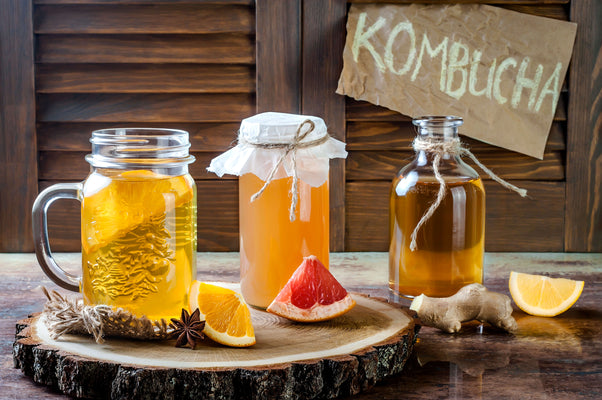Kombucha is a refreshing fermented tea enjoyed all over the world for more than a thousand years now. It is produced from sweetened black or green tea, various herbs, fruits, and vegetables.
Get a free sample pack!
It is a healthier alternative to sugary soft drinks as it is low in sugar and packed with immune-boosting nutrients, organic acids, and antioxidants. This exciting beverage can be taken in the early morning hours when you need to kick start your day or in the evenings just to relax after the day's work.
However, this magical tea with its unique taste and numerous health benefits may be considered unfit for consumption by devout Muslims, for some reasons. Read on to know the point of view behind this argument and the reasons this beverage may be considered haram or halal.
To better understand this tea's halal status, we have to take a look at the ingredients used and the processes involved in their production.

Kombuchas ingredients
Kombucha's selling point has always been its ability to give a rich taste from simple ingredients. These ingredients include;
Yeast
An important ingredient in making kombucha is yeast.
We have two types of yeast, the type used determines the halal status of the Kombucha drink. Brewers' yeast is not halal because it is a byproduct of beer or alcohol, whereas bakers' yeast is.
Water
This is the natural gift from God to man, Of course, no questions asked it is halal!
Sugar
Sugar is produced from two different sources, and while both processes may be similar and give the same results, only one can be said to be halal. Beet sugar is halal while bone char isn't as it requires a haram animal byproduct.
Different flavours
A range of flavours is used to give the kombucha any of its different tastes, it could be halal or haram depending on the flavour used.
These ingredients are simple and primarily halal, but the processes involved in their production are a bit complex and place a question mark on their halal status.
Process of making kombucha
Kombucha is quite similar to apple cider. Both are sweet, fizzy, often yellow-orange and made through the process of fermentation.
The fermentation process has always raised halal arguments as it results in the production of alcohol, which is haram according to the laws of Islam. The kombucha is prepared by soaking tea and sugar in boiling water. The mixture is allowed to cool, and then the yeast is added.
The mixture is covered and allowed to ferment, the yeast degrades the tea and sugar mixture. The longer it is left, the more alcohol it would have. The mixture is then placed in an airtight container where additional sugar and flavours are added.
Now the answer you’ve all been waiting for;
Is it halal?
Regarding alcohol, halal regulations are relatively tight, however, there are a few minor exceptions under some conditions.
Kombucha is considered halal for three reasons;
The natural process of production
Islamic scholars view kombucha as halal because, despite its low alcohol content, it is produced as a byproduct of a completely natural process.
Low alcohol level (0.5)
Another reason it is acceptable for consumption is that the alcohol level is so low, that you can't get drunk by just sipping the tea. This could also be seen in cases like sauerkraut, kimchi and kefir production.
The fermentation processes don't provide enough alcohol to make it forbidden in Islam. The alcohol here is similar to the amounts found in fruit juices and other non-alcoholic beverages sold in stores.
Fun fact: bananas contain more naturally occurring alcohol than kombucha!
It is a healthy food
According to Islamic scholars, consuming chemicals and foods that are primarily healthy is acceptable. You must, however, store your kombucha in the refrigerator so it does not ferment further, increasing the alcohol level.
Health benefits of kombucha
Kombucha offers various health advantages, some of which are;
- Source of probiotics, bacteria that live in your body to keep you healthy.
- Antioxidants, protect the cells and help guide them against most diseases.
- Aids digestion.
- Kombuchas are good sources of vitamin B.
- Increases mental wellness.
- It has also been said to reduce the risk of heart disease, manage diabetes, and protects against cancer. However, this point has not been proven as research is still ongoing.
Side effects
There are a couple of downsides to this lovely tea consumption and some of them include;
- It is not suitable for everyone and may be harmful to expectant or nursing mothers, or people with impaired immune systems.
- According to research by a New York health magazine, excessive drinking might cause nausea, dizziness, and stomach aches.
- Also, Long-term fermentation is not advised in a bid to keep the alcohol level at bay.


